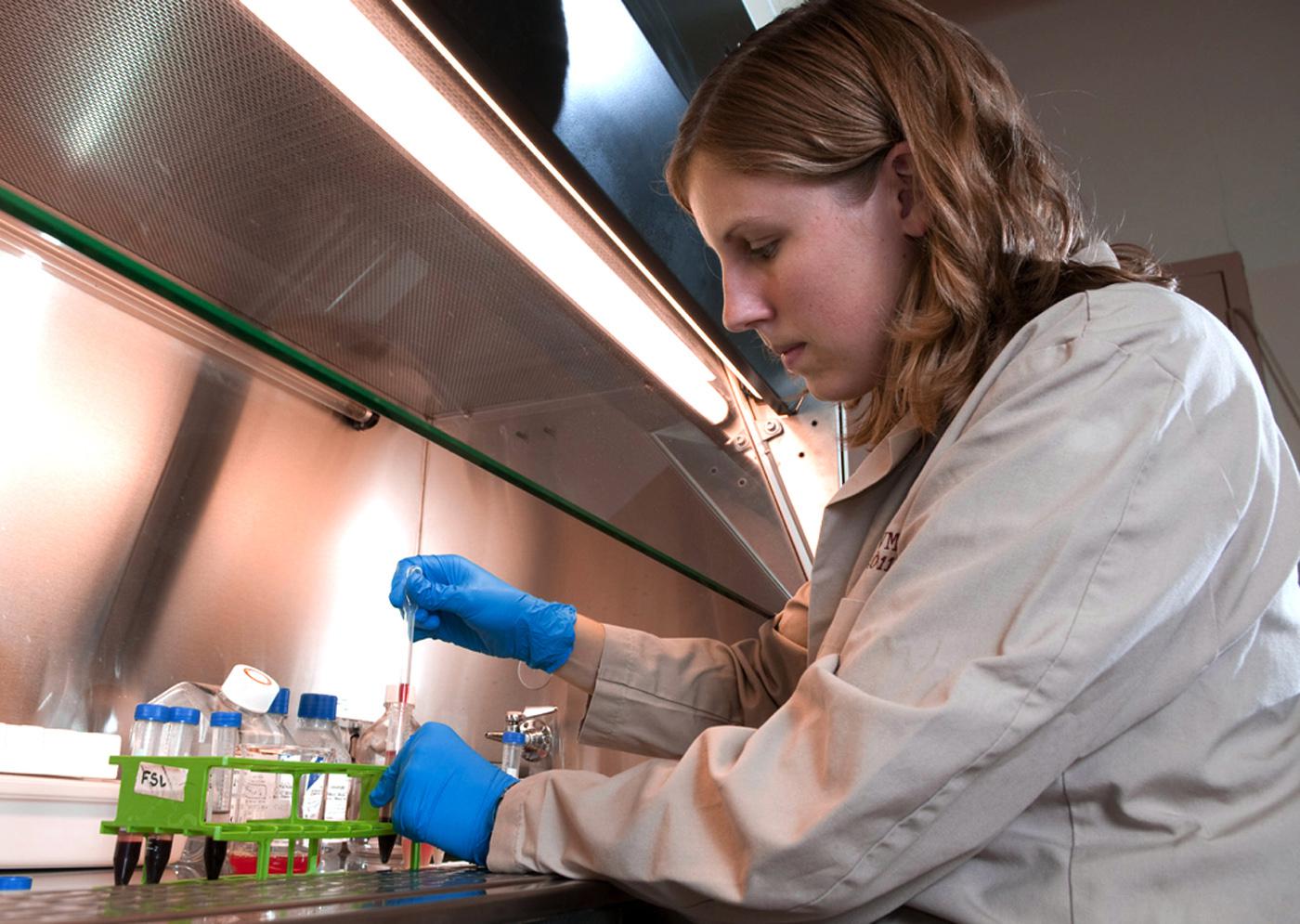Information Possibly Outdated
The information presented on this page was originally released on July 22, 2010. It may not be outdated, but please search our site for more current information. If you plan to quote or reference this information in a publication, please check with the Extension specialist or author before proceeding.
MSU veterinary student earns top research honor
MISSISSIPPI STATE – A veterinary student at Mississippi State University doing grant-funded research on the immune system of dogs received the highest award given for her presentation in an international competition.
Claire Fellman, a fourth-year MSU College of Veterinary Medicine student from Ocean Springs, received a Morris Animal Foundation Veterinary Student Scholars grant last year to study immunosuppression in dogs.
In late June, Fellman was one of more than 20 veterinary students who presented their research, which was funded through Morris Animal Foundation Veterinary Student Scholars program. The students represented some of the nation’s most prominent colleges of veterinary medicine and also included students from Argentina, Australia and the Netherlands. Fellman received first place in the competition in Denver and a prize of $5,000.
“Claire Fellman is a superior scholar with a high potential to become a clinician-scientist. This national recognition testifies to the creativity and initiative of Claire and her faculty mentors,” said Dr. Kent Hoblet, dean of MSU’s College of Veterinary Medicine.
Specifically, Fellman is measuring the effectiveness of the drug cyclosporine in suppressing T cell activity in dogs. This research has implications for both animals and humans.
“Autoimmune diseases cause immune systems to overreact and turn against the body. To treat patients with autoimmune diseases, you have to suppress this response,” Fellman said. “Cyclosporin is a drug commonly used to suppress the immune system in patients with autoimmune diseases and in transplant patients to prevent organ rejection triggered by the immune system.”
T cells direct the immune system and allow the body to produce antibodies against foreign pathogens and destroy invading organisms.
“When T cells respond inappropriately, they no longer have a protective effect and instead cause the body to turn against itself,” Fellman said.
Although cyclosporine is used regularly in humans and animals to suppress this rogue immune response, Fellman said it is hard to dose correctly. She is trying to develop a blood test in dogs that will measure the effects of cyclosporine and other immunosuppressive drugs.
“When we know what the T cells are doing, we can get a better idea of how the treatment is working and can better determine the appropriate dose of cyclosporine,” Fellman said.
She began this project while participating in CVM’s summer research program between her first and second years of veterinary college. She received the Morris Animal Foundation grant to continue the work between her second and third academic years. Now in the fourth year of her doctor of veterinary medicine program, she has begun a Ph.D. program at CVM.
Her research is part of a larger, collaborative project being undertaken by Drs. Kari Lunsford, Todd Archer and Andrew Mackin, specialists in internal medicine and faculty in the CVM clinical sciences department. Joining the clinical sciences team are immunologists Drs. Todd Pharr and Lesya Pinchuk, and John Stokes of CVM’s basic sciences department, and Becca Flores, this year’s CVM summer research scholar.
“This question is important to veterinary medicine and also potentially to human medicine,” said Lunsford, assistant professor of internal medicine in CVM’s clinical sciences department.
Lunsford said in addition to use in organ transplant patients, cyclosporine is also used to treat many immune-mediated diseases in animals and people, including immune-mediated hemolytic anemia, a disease in which the patient’s own immune system attacks and destroys red blood cells.
“The problem is we really don’t know what dose to use. Even in human medicine, it’s trial and error,” Lunsford said. “Cyclosporine is a tricky drug. It is taken orally, but absorbed differently person by person, dog by dog or cat by cat.”
To date, cyclosporine doses have been based on how much drug is in the bloodstream, and these target blood levels are based on clinical studies evaluating how many patients respond favorably to that amount and how many do not, Lunsford said. Fellman’s research is attempting to look directly at T cells’ response to cyclosporine and develop a simple blood test to determine the appropriate cyclosporine dosage.
“The goal of our research is to look at what the drug is doing to affect the immune system,” Lunsford said. “We are trying to identify patients who are immunosuppressed by looking to see if the T cells have stopped working.”
After she earns her DVM degree, Fellman said she looks forward to expanding her clinical training by working toward specialty certification in veterinary internal medicine.
Contact: Dr. Kari Lunsford, (662) 325-3432




